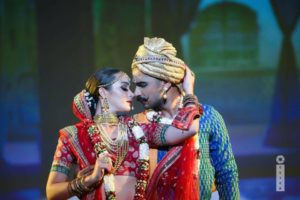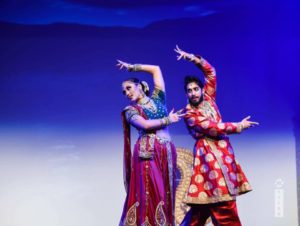Poornima Sharma’s ‘Moksha’ teaches valuable lesson on karmic destiny
By Neeru Saluja
Photo credit: Balzinder Balz Iclick
“Desire is the cause of suffering” denotes Buddha’s teachings known as ”˜dukkha’. In today’s generation, the desires and ambitions are never fulfilled which leads to dissatisfaction in life. The dance drama production ”˜Moksha’ transported us into the era of Buddha teaching the valuable lesson of karmic destiny and ”˜dukkha’.
Shri Raghavan Nair’s Indian Dance Centre has promoted the traditions of Indian dance and culture in Australia since 1987. Keeping this tradition intact, the show started with the traditional diya lighting by High Commissioner of Fiji, Mr Yogesh Punja, Mr RB Karjee, Consul Director Indian Culture Centre and the Nair’s family priest and guruji Pandit Sadanand Sharma. The charming MC Nitin Madan graced the show with his impeccable command over the Hindi language. Followed by this were traditional classical dances by the head of IDC Raghavan Nair, Sheila Nair, Suhasisni Sumithra and Ira Pathkar who ignited the flow of the show with their graceful dance forms.
Set in 490 BC India, Moksha is based on a story from the Buddhist and Jain folklore. King Bimbishar of Magadha is blessed with a baby boy (Prince Ajatashatru) when he is at war. A prophecy reveals to his wife that the young prince will kill his own father so the Queen orders for her son to be abandoned in the forest. As fate would have wanted, the King finds the baby in the forest and asks his Minister to look after the baby. When the King returns back from war, he asks about his son. His wife tells him about the prophecy and though the King is shattered, he suggests to raise the abandoned baby as their own child. As a joyous surprise, the Queen tells him that this is their child and they raise him to be the best warrior.
The prince is ambitious and to take over other kingdoms he is ill-advised to kill his own father. Blinded by greed and ambition, King Bimbishar is imprisoned to death. Meanwhile, Prince Ajatashatru is blessed with a son and as he is filled with love he realises the importance of the love from his father. He repents but it’s too late, his father has been killed. He therefore becomes a disciple of Buddha vowing to never hurt anyone again.
To teach this valuable lesson from Buddhism faith, artistic director Poornima Sharma and her team has been working hard for more than a year. With rehearsals going on since the past nine months, the cast left no stone unturned to make this production a success. All the actors lived and breathed their characters working on their body language, poise, appearance and dance to get into the golden era. While her father Raghuvan Nair shaved his head to look like a Bhikshu, her son Ravi Sharma also did the same and sported a moustache. Poornima herself designed the beautiful costumes and exquisite jewellery so they reflected the grandeur of a kingdom. The photos and slides shown in the background were glimpses from the rich cultural heritage of the Nair’s family itself.
All of the hard work was witnessed by Sydney in a dance drama par excellence. The rich visuals, grand props, dazzling costumes, classical dances and acting performances expressed the story without saying many words. While in one scene we were transported into a jungle where Buddha is meditating, in another scene the audience was rejoicing the birth of a child with the performers. The acting by the lead actors stood out as their expressions spoke of love, anger, fear and joy.
The brainchild behind this event Poornima Sharma was keen to present something different to Sydneysiders. “I chose a story from Buddhism as the younger generation will connect more to this this type of story. Everyone knows about Lord Rama and Lord Krishna. Good karma is an universal language. There are consequences when you make wrong decisions in life. Your action is bound to create reaction. The youth of today are very much career-oriented and ambitious, but amidst this they forget to understand the value of relationships. Specially with parents who are the teachers of your life. I wanted to showcase something which the younger generation could relate to and through different classical forms of dance, which is the true depiction of our rich culture, not Bollywood.”
Despite the show being sold out and a stupendous success, Poornima gives all the credit to her students. “I feel blessed that this show has been appreciated by the audience. I would like to dedicate this show to my students who come from all kind of multicultural backgrounds. I can direct and choreograph the show but they have left their family, social commitments to dedicate their nine months to me” says humble Poornima.
Short URL: https://indiandownunder.com.au/?p=8502




